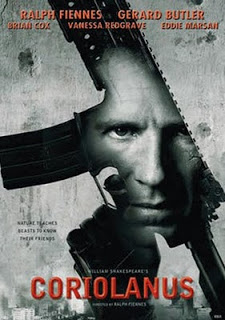Ever since I was old enough to understand what a movie director does, I’ve been curious about those situations where someone both stars in and directs his own movie. So, basically, he’s the boss of whether he did a good job? How can you do that?
Ralph Fiennes, star of the upcoming Coriolanus (coming December 2012, by the way), gives me some insight into this problem. He says that, as director, he thought that his own performance at times was horrible.
“‘Oh, that’s horrible,'” was how he recalled his initial reaction to
his performance. Fortunately, he said his editor “managed to stick it
together” into something he’s proud of.
Fiennes said he had to be ruthless on his work as an actor to keep
the film moving, and he came close to regretting his decision to star in
the film.
“I’ve been indulged by directors who allowed me an extra take but I
had to deny myself,” he says during interviews at the Toronto
International Film Festival. “It was hard.”
I honestly don’t know much about Ralph Fiennes – other than the English Patient and Lord Voldemort, I had to go visit IMDB to see what else I might know him from. This article, though, makes me like him. He’s not shy about being a first time director, giving plenty of credit to the editor above for managing to stick everything together. Later in the article, on the subject of Vanessa Redgrave as Volumnia, he says simply that he knew to “shoot her well, and get out of the way.”
I am very curious to see how this movie does. Coriolanus always struck me as a more political, and therefore boring, play. Wait, hear me out! You may love the political stuff, and can make a strong argument that those are the best plays. I’m just looking out at the world at large and wondering what your average audience is looking for. Love, romance, tragedy, sword fights, comedy? You have to admit, hardly anybody experiences Coriolanus unless they go out and hunt it down – and even rabid Shakespeare geeks rarely put it in their top 10.
But! We live in some serious politically-charged times. People love their war movies. So, who knows? Maybe I’m not giving people enough credit? Only the box office knows for sure …


